I would like to propose that Germany's involvement in the Castillan-Byzantine war be limited to a naval blockade, as it would allow us to keep our army maintenace low and reduce the number of potential German casualties.
Sonderweg oder Anderweg? -- An interactive AAR in the Hohenzollerns megacampaign
- Thread starter Avindian
- Start date
-
We have updated our Community Code of Conduct. Please read through the new rules for the forum that are an integral part of Paradox Interactive’s User Agreement.
You are using an out of date browser. It may not display this or other websites correctly.
You should upgrade or use an alternative browser.
You should upgrade or use an alternative browser.
Herr Brunelli,
I respect your pacifism, but the Castillan war against the Byzantines is to regain part of their homeland. As a supporter of Italian autonomy, do you not feel that Castile's cause is just?
-Friedrich von Hohenstaufen
Mayhaps their cause is just, but we should not involve ourselves and waste precious lives.
As to the Venetian rebellions, I sympathize with their concerns but I do not support their methods. However, I do not think they deserved to be violently slaughtered.
((Re Venetian rebellion: this is where I really hate p'dox rebels since you have no choice to kill or be killed. It leaves my character in a bind because he doesn't support armed rebellion but he also doesn't support violently crushing it. Maybe we can say that they just got "arrested" if we put the rebellion down?))
((Welcome to the clubMayhaps their cause is just, but we should not involve ourselves and waste precious lives.
As to the Venetian rebellions, I sympathize with their concerns but I do not support their methods. However, I do not think they deserved to be violently slaughtered.
((Re Venetian rebellion: this is where I really hate p'dox rebels since you have no choice to kill or be killed. It leaves my character in a bind because he doesn't support armed rebellion but he also doesn't support violently crushing it. Maybe we can say that they just got "arrested" if we put the rebellion down?))
I support action against the Byzantines, as we must stand by our allies.
- DDr. Gotha
- DDr. Gotha
((Okay, so I'd already configured the spreadsheet to include the HUN, and until the elections, it's hard for me to calculate anything.
However, given the overwhelming support, we shall indeed declare war on the Byzantines, but only to restore their core to them.
Similarly, the revolt shall be crushed with military force. In the future, I fully recognize V2 doesn't have a negotiate mechanic, but that doesn't mean we can't work around that with the console and save editing, if need be.
Jack LEagle, you are war minister. You may choose a Chief of the Army, a Chief of the Navy, both, or neither.
Gen. Marshall, what is your party's official position on Dadarian becoming an Imperialist?
Lastly, I'm going to post an update for everything up to the beginning of the war, which will include some maps of the Byzantine positions, to help Jack with the war planning. I'll do this in an hour or so. We'll then have a second update, covering the war and the election.))
However, given the overwhelming support, we shall indeed declare war on the Byzantines, but only to restore their core to them.
Similarly, the revolt shall be crushed with military force. In the future, I fully recognize V2 doesn't have a negotiate mechanic, but that doesn't mean we can't work around that with the console and save editing, if need be.
Jack LEagle, you are war minister. You may choose a Chief of the Army, a Chief of the Navy, both, or neither.
Gen. Marshall, what is your party's official position on Dadarian becoming an Imperialist?
Lastly, I'm going to post an update for everything up to the beginning of the war, which will include some maps of the Byzantine positions, to help Jack with the war planning. I'll do this in an hour or so. We'll then have a second update, covering the war and the election.))
1853, part 1: An eagle awakens
Of all the languages spoken in Germany, among the least familiar to the average citizen was Greek. In the past, the Byzantine Empire had been among the most deadly and persistent enemies of Germany, stretching back to the days of the County of Nürnberg. Yet, as the nineteenth century opened, the Byzantines had all but abandoned their European and Asian aspirations for dominance in the New World. As July 1852 began, most Germans continued to be blissfully unaware of the Byzantines. The latest foreign news was the formation of a new bloc of alliances between Germany, her economic associates, and the sovereign nation of Brittany.
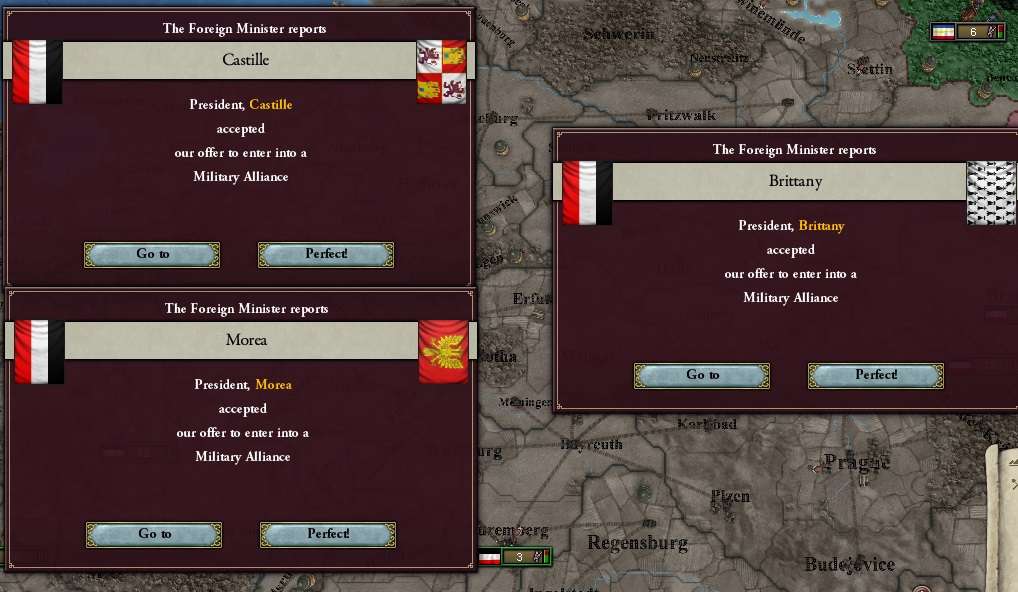
The annexation of the tiny nation of Montenegro by the Byzantines a few hours later did not merit even second page attention; those newspapers that chose to carry it did so on the same page as the latest crop reports and well after the gossip of Ferdinand von Hohenzollern’s first steps. One of Ferdinand’s cousins, Fritz, was in the news too, as his railroad companies continue to grow and prosper as new science took hold.
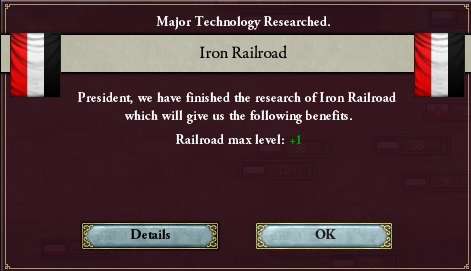
The two main trunk lines of the Republic – from the capital to the port of Amsterdam, and from the capital to northern Denmark – were funded with grants from the government.

Rumors of further discovers, namely, government spending in the areas of cheap steel, spurred further growth, as even private corporations and individuals invested heavily in the German rail network. This new torrent of investment did not, however, reach the African colonies. Chancellor Bismarck and Finance Minister Fellman traded speeches over how much the German government ought to be involved in colonial affairs, with the Chancellor arguing for direct administration from Berlin and Dr. Fellman’s insistence on a level of autonomy. While both were skilled orators, the Conclave seemed to favor the Chancellor’s point of view. More importantly, a few more local elections for Stadtholders were decided in favor of the New Society.
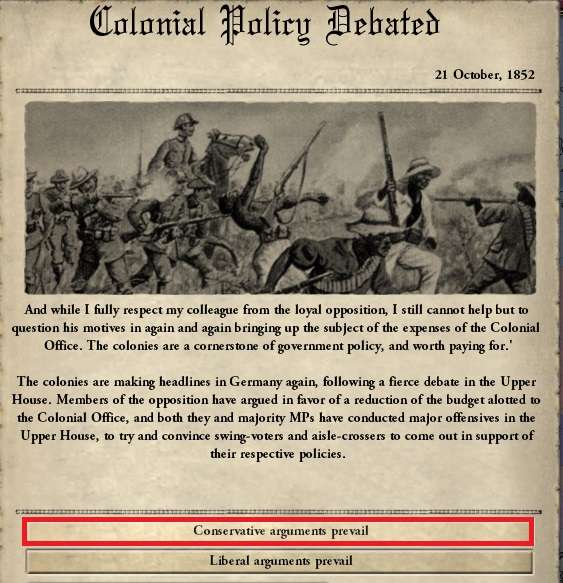
If few Germans remembered the giant to their east, how many fewer knew of the insignificant kingdom of Pskov, in the Caucasus Mountains? Yet those very same mountains provided an excellent opportunity for Jacobins to win another victory, as native Pskovites took to the heights whenever the Royal Pskov Police chased after them. Thoroughly exhausted, the king abdicated, and one of the very first measures taken by the new President of Pskov was to seek the rehabilitation of their lands in Kars.
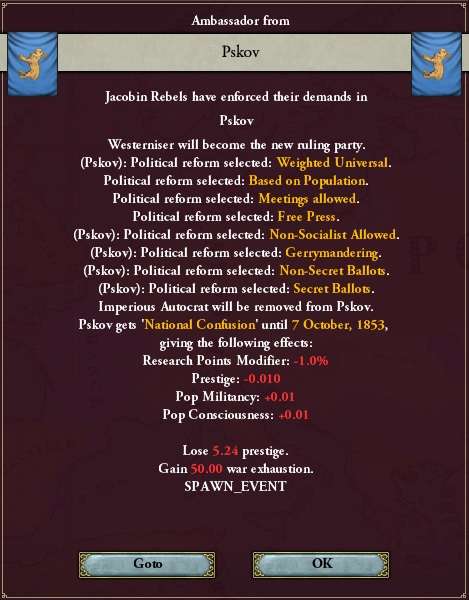
The Byzantine Empire, seizing the opportunity to expand its own influence in the region, immediately agreed to back the claims of Pskov. Ethiopia, who feared the presence of a revolution in her own country, supported Ak Koyunlu in the hopes of containing the rebellion. Germany, Transylvania, and Poland all declared interest in the crisis, and the fate of the tiny republic lay in their hands. Foreign Minister Unger’s leadership mobilized the Assembly effectively, selecting a team of highly trained foreign policy experts from every party, and the response was resounding support for Pskov. Transylvania took this as a sign, and began making their own overtures of support for Pskov.
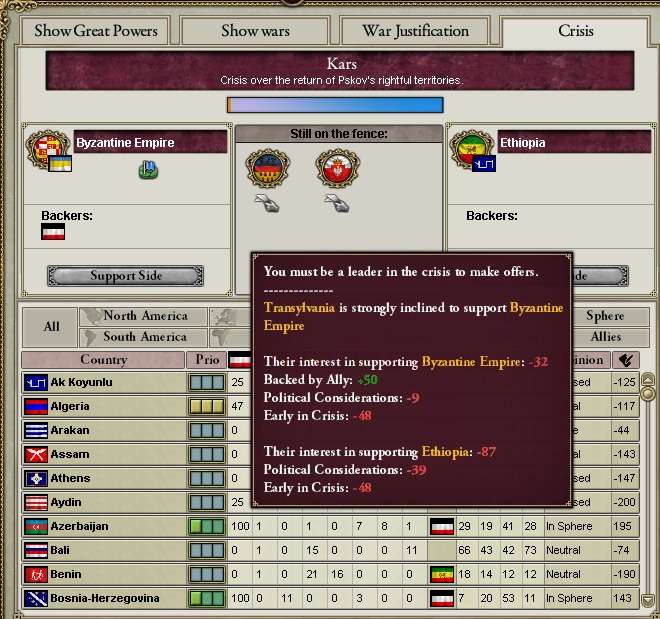
Foreign Minister Unger’s plans did not meet with no opposition. His proposal to raise taxes and increase the readiness of German forces, while acceptable to the crisis negotiators, were particularly unpleasant to the newly named Deutsche Allianz. In a stirring speech, the Foreign Minister proclaimed, “All peoples have a right to be free, to enjoy the protection and friendship of their own people, and to discard the rule of unenlightened tyrants. Indeed, even the German Army and Navy will be committed to win the people of Pskov their freedom!”
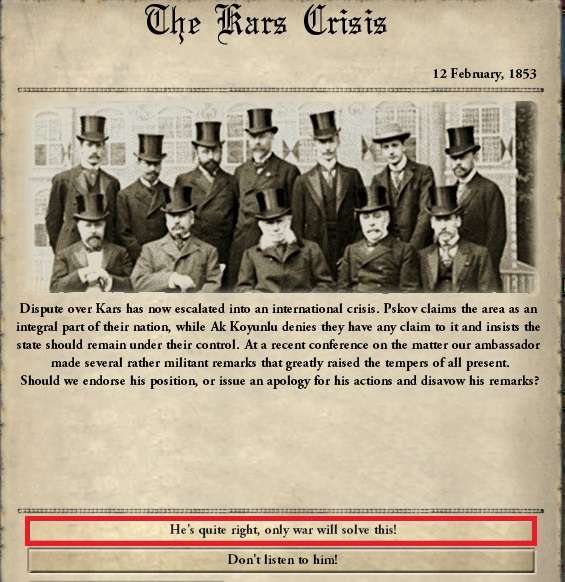
This new policy caused immediate and drastic consequences; indeed, there were rumors that Byzantine troops had actually crossed the border into Ak Koyunlu, although they quickly withdrew and admitted it was simply “a difficulty with the road signs.” Road signs could not explain the sudden appearance of Byzantine arms and pounds in the arms of rebels, however. The government of Ak Koyunlu crumbled before the well-armed revolutionaries.
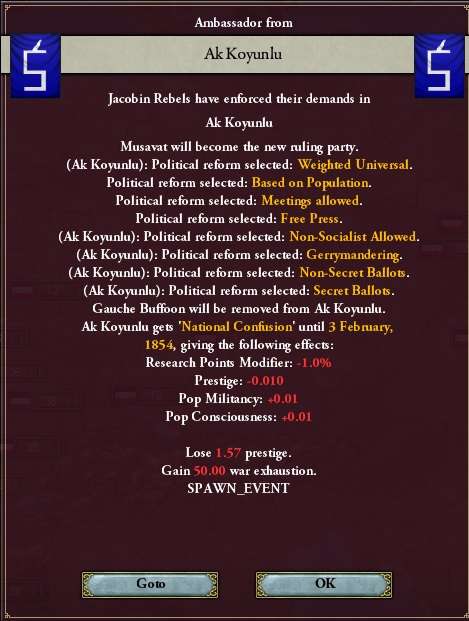
It almost threatened to dissolve the German government as well. The reaction to Foreign Minister Unger’s emergency tax, and in particular the Finance Minister’s expert testimony that funding an actual war against Ak Koynulu could result in a “23% increase” was swift and unpleasant. The newly-restyled Guglielmo d’Absburgo called for a vote of no-confidence, citing “incompetence, or even corruption.” In response, fellow member of the UAI and Minister of the Interior Altmark stood up to defend his party leader. He in particular criticized d’Absburgo for a slip of the tongue, when the Vienna native called Germany the “Germano-Italian Republic”, accusing him of treason. Altmark accused d’Absburgo of treason, postulating he or his family might be funding the Italian rebels which had plagued Germany ever since the Hohenzollern-Bern assassinations.
D’Absburgo was outraged, but the DDA leader (and Roman-born) Carlo Brunelli took it one step further: he challenged Altmark to a duel, right there, in the middle of the Conclave. Altmark snidely remarked that he had no wish to waste his good German bullets on an Italian separatist. [1] Dr. Fellman, trying to maintain some semblance of order, demanded Altmark apologize behind closed doors; when Altmark refused, Fellman expelled Altmark from the UAI, with the support of the other leading members. Altmark did not respond, simply crossing over to the Imperialist side of the Conclave.
While all of this was happening, the new government of Ak Koyunlu turned to their Ethiopian allies and requested their offices in negotiating a settlement with Pskov and the Byzantines. A deal was quickly arranged; the lands would be transferred to Pskov and the new Republic formally recognized, in exchange for recognition of Ak Koyunlu as a brother republic and the assistance of all parties involved in preventing further disturbances.
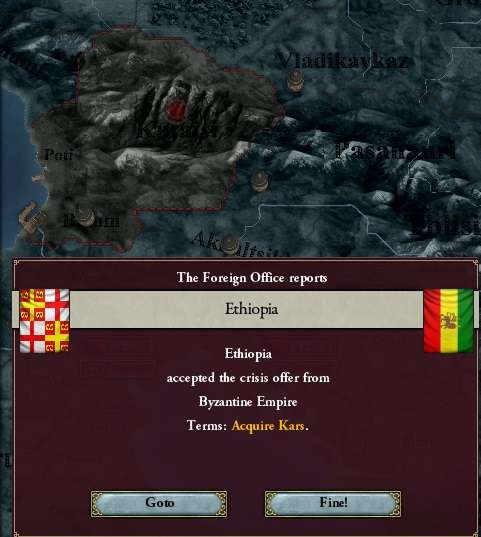
The Foreign Minister was about to formally repeal the emergency tax credits when a group of Jacobins seized six provinces in Italy and German Croatia. The Interior Minister called this attempt “laughable” and wasted no time in dispatching the Gendarmerie.
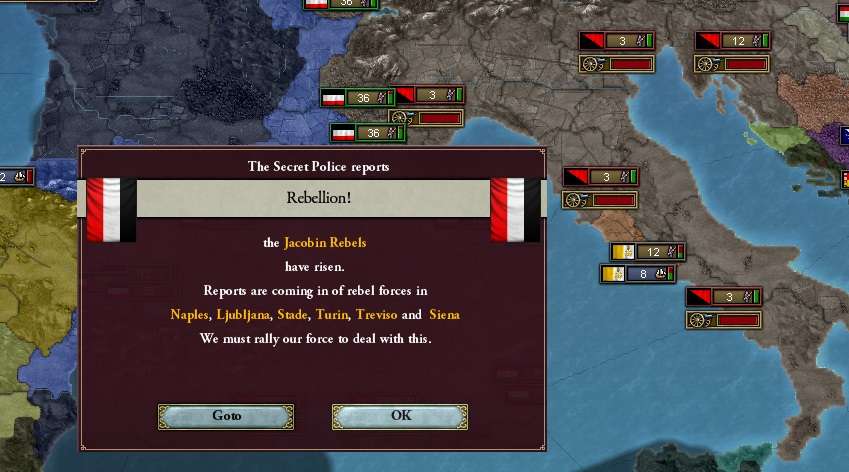
Although the provinces were overwhelmingly Italian, their leaders were German. One of them, Rudolf Schmitt, proclaimed that he would “march to Nürnberg and shoot the xenophobe Altmark himself, if he but could.” The leader of the moment was captured in Ljubljana.

When interrogated, “Edmund” simply refused to answer questions. The sergeant of the Gendarmerie asked, out of genuine curiosity, why so few Jacobins appeared. “Edmund” turned bright red and muttered only “I should have listened to Herr Marx… the time was not yet right.” As if in prophesy, only a few days after the ringleaders of the rebellion were arrested, a group of very well armed Lombards rose up in Venice. They wanted to see a “Republic of Lombardia” formed, with Milan as the capital, and were prepared to fight any and all comers to see that become a reality.
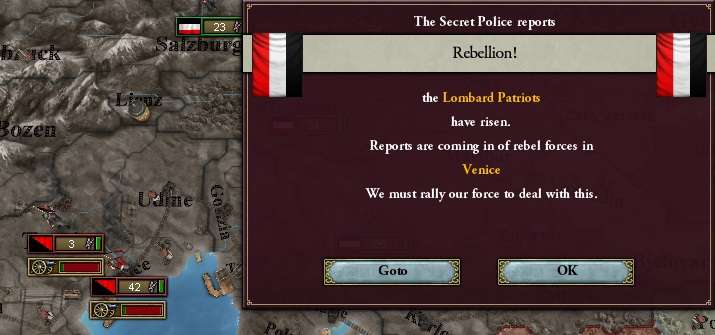
While the German government debated what to do, one final crisis erupted, this time in Spain. The Byzantine Empire’s successful meddling in international politics provoked reactions even there. A clandestine society of right wing mercenaries overthrew Grenada’s government and began menacing neighboring Castille.

Castille immediately sent a telegram to Foreign Minister Unger, requesting aid to defend Castille, should Grenada attack. They also formally requested that the Byzantines allow Castille the use of their base at Santander for repairs, should the need arise. The Byzantines laughed in the face of the Castilian ambassador. Castille, insulted, declared war on the Byzantines on the spot. After a hurried session of both houses of the German government, the overwhelming majority of Stadtholders and Assemblymen voted for war. Castille agreed to defer to German judgment in negotiating a peace.
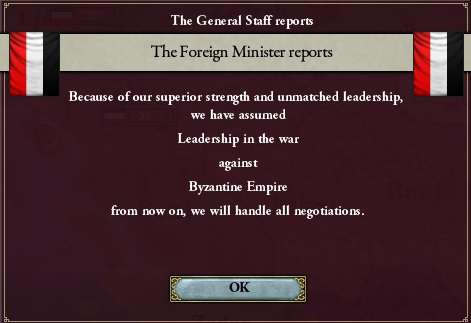
The Byzantine Empire might have a small army and navy, but her potential resources were vast.

There were two major theaters for German involvement, as most strategists considered. Apart from Spain itself (and everybody knew Santander would not last long), the Balkans and Mediterranean offered ripe possibilities for attacking Byzantine influences without the danger of a cross-ocean invasion.
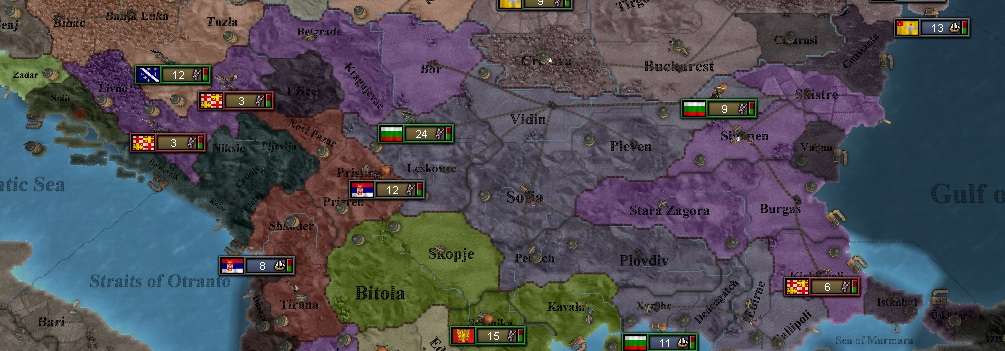

Regarding the Balkans, all of the German economic partners openly agreed to come to Germany’s aid, should she require it, and more significantly, Transylvania sought to repay the kindness of Germany in breaking Hungarian power. Of course, Transylvania also hoped any potential intervention on her part might lead to additional lands. The War Minister, Hals Gutfreund, had planning to do, as did the Foreign Minister, if they wished to enlist aid of Germany’s friends.
There was also an election, scheduled to begin in a mere 60 days.
[1] I hope you won’t mind me putting words in your mouth, Dadarian.
So, EtzelHoveri, it’s up to you if we call in allies or not. Even Brittany will accept the call, should we desire, as well as our sphere and Transylvania.
Jack LEagle, I did the best I could to get you province level maps; the Byzantines are just too big to give you more detail. The capital is in Montevideo, but I don’t think a cross-ocean invasion is necessary.
With war coming on the Iberian peninsula, the Balkans, the Atlantic Ocean, and even revolution in Italy we need to look to our allies for assistance. Transylvania should be called on to capture the Byzantine Balkans.
-Hugo Unger
-Hugo Unger
I must apologize for my long absence. My help was required to finish development and testing of our new railroad technology. It appears that matters have been interesting in my absence.
FM
FM
Volunteers for the positions of Chief of the Army Staff, and Chief of the Navy Staff?
I offer my services as either Chief of Staff, unless a more qualified candidate wishes to have one or both of those positions.
((My character has an army background, so it would make more sense for him to be the Army CoS from a RP perspective, but I'd be fine with being the Navy CoS.))
Ministry of War
Subject: Appointment of Chiefs of General Staffs of the Army and Navy
Subject: Appointment of Chiefs of General Staffs of the Army and Navy
Effective immediately, Friedrich von Hohenstaufen is appointed Chief of the General Staff of the Navy, and Hugo Unger is appointed Chief of the General Staff of the Army. Each appointment is in effect immediately, and will terminate upon the end of hostilities with the Byzantine Empire.
Hals Gutfreund, Minister of War
((Could we get maps of areas that are besieged by rebels, where each army/navy is and their general/admiral as well as who is available?))
Review of the Armed Forces of Germany, 1853
Good afternoon, gentlemen. I beg you, wherever you have questions, to please consult the slightly outdated version of this report. In particular, the jargon of the Army and Navy concerning generals may elude you without access to this information.
Our present forces are divided into three theaters. We have the Western armies:

The Italian armies:

And the Eastern armies:
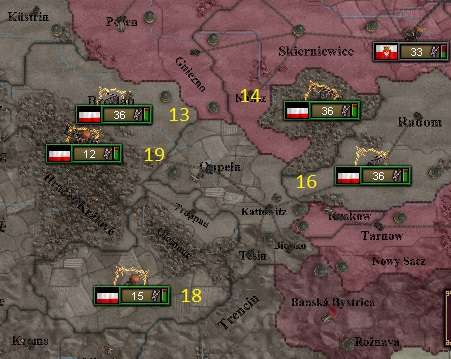
Our fleet, which remains the same as it did in 1836, consists of 37 men o' war, 8 frigates, and 59 transports. It is stationed in Nice, at present.
17th Army is, per the orders of the Conclave and Assembly, already moving to engage the enemy in Venice. 11th Army, presently engaged with rebels, will move to wipe out the brigade of rebels in Naples within a day or two. 9th Army is presently engaged in combat with rebel forces, but victory is all but certain and should take no longer than 72 hours, according to our best estimates.
The following list includes every flag officer (General and Admiral) in the Republic.
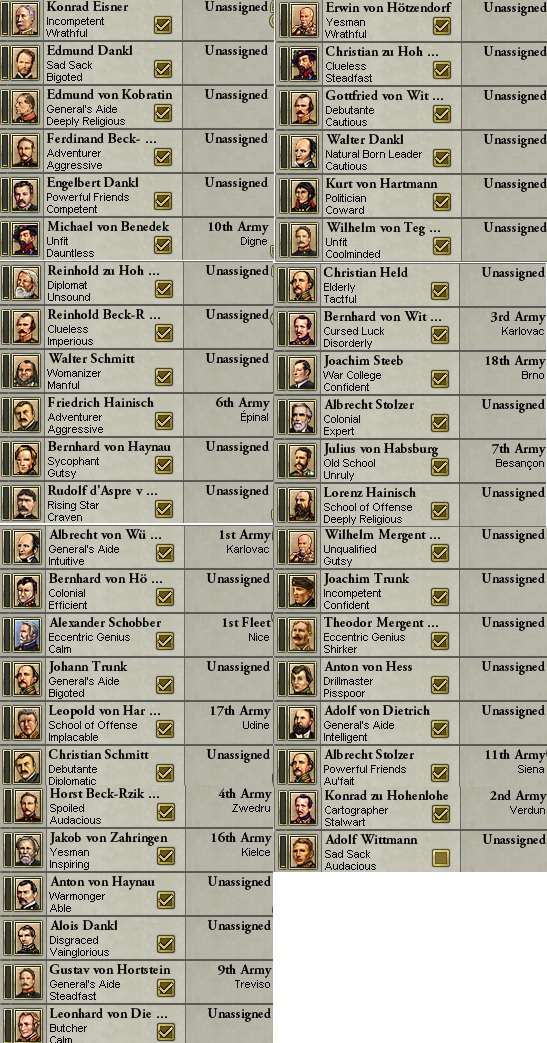
Retirements and deaths have depleted the western armies, in particular, of the officers needed for combat.
The above maps do not include the single brigade of rebels in Stade (20th Army, a cavalry army, is the closest and awaits orders to pursue them), the Artillery Training Brigade based in Nürnberg, or the African garrison.
Good afternoon, gentlemen. I beg you, wherever you have questions, to please consult the slightly outdated version of this report. In particular, the jargon of the Army and Navy concerning generals may elude you without access to this information.
Our present forces are divided into three theaters. We have the Western armies:

The Italian armies:

And the Eastern armies:

Our fleet, which remains the same as it did in 1836, consists of 37 men o' war, 8 frigates, and 59 transports. It is stationed in Nice, at present.
17th Army is, per the orders of the Conclave and Assembly, already moving to engage the enemy in Venice. 11th Army, presently engaged with rebels, will move to wipe out the brigade of rebels in Naples within a day or two. 9th Army is presently engaged in combat with rebel forces, but victory is all but certain and should take no longer than 72 hours, according to our best estimates.
The following list includes every flag officer (General and Admiral) in the Republic.

Retirements and deaths have depleted the western armies, in particular, of the officers needed for combat.
The above maps do not include the single brigade of rebels in Stade (20th Army, a cavalry army, is the closest and awaits orders to pursue them), the Artillery Training Brigade based in Nürnberg, or the African garrison.
I belive that our navy should be used to effectively cripple the Byzantine fleet. Therefore, I propose that we detach a squadron of 15 men o' war and 5 frigates under the command of Admiral Schobber to seek out and destroy the Byzantine navy. If they should find the enemy fleet in port in South America, a blockade of 11 men o' war and 2 frigates should be established. This force should be enough to deter the Byzantines from attempting to break out of their port. If Admiral Schobber's squandron engages and eliminates the enemy, then they should detach several blockades along the South American coast. Meanwhile, the remaining ships should blockade the Byzantine ports in Europe. 5 men o' war should be held in reserve to protect the transports, should the Army require them. I will allow the Army to use these transports and their escorts however they wish to ensure optimal strategic mobility.
-Friedrich von Hohenstaufen, Chief of the Naval General Staff
-Friedrich von Hohenstaufen, Chief of the Naval General Staff
It seems one of my German uncles has made promotion since the last time I have talked to him. I knew he was making progress with his army career but seeing him as the chief commander of one of the armies of the west is truly great news even though I oppose war.
Guglielmo d'Absburgo (DDA)
((He's actually been there since 1836, if memory serves.
It seems one of my German uncles has made promotion since the last time I have talked to him. I knew he was making progress with his army career but seeing him as the chief commander of one of the armies of the west is truly great news even though I oppose war.
Guglielmo d'Absburgo (DDA)
I met him once, he was quite an unruly fellow
((I love V2's ridiculous general descriptions :laugh
We will have two theaters of operations. The first being the Balkan Theater which will be compromised of the 3rd, 5th, 7th, and 16th. The other will be the Rebel Theater which will be compromised of the 9th and 20th. There would have been a western theater but there will be no invasions across the Atlantic and I have faith in Herr von Hohenstaufen keeping back any naval invasions. Should it be required we can look to transferring soldiers that way within the year.
Generals
3rd Army will keep their General.
5th Army will be assigned Albrecht Stolzer.
7th Army will keep their General.
9th Army will keep their General.
16th Army will keep their General.
20th Army will be assigned Engelbert Dankl.
Movements
3rd will move south and take the Byzantine lands connected to Germany. Once these lands are captured they will take the ships used by 5th and 7th to the Black Sea Byzantine lands.
5th will move south with 7th Army to take ship to the Byzantine controlled Greece. They will move together capturing from the northwest south then east.
7th same as above. They will be one province next to 5th Army in case they are in need of aid or vid versa.
9th will finish their engagement before joining the 17th in their attack against the Venetian Rebels. Following that if there are any more rebels in the Italian Peninsula it will be their task to pursue and eliminate them.
16th will join 3rd in its attacks taking the lands bordering to 3rd.
20th will be tasked to move against the rebels in Stade. They will then move against any other armies in the area should they arise.
Generals
3rd Army will keep their General.
5th Army will be assigned Albrecht Stolzer.
7th Army will keep their General.
9th Army will keep their General.
16th Army will keep their General.
20th Army will be assigned Engelbert Dankl.
Movements
3rd will move south and take the Byzantine lands connected to Germany. Once these lands are captured they will take the ships used by 5th and 7th to the Black Sea Byzantine lands.
5th will move south with 7th Army to take ship to the Byzantine controlled Greece. They will move together capturing from the northwest south then east.
7th same as above. They will be one province next to 5th Army in case they are in need of aid or vid versa.
9th will finish their engagement before joining the 17th in their attack against the Venetian Rebels. Following that if there are any more rebels in the Italian Peninsula it will be their task to pursue and eliminate them.
16th will join 3rd in its attacks taking the lands bordering to 3rd.
20th will be tasked to move against the rebels in Stade. They will then move against any other armies in the area should they arise.

